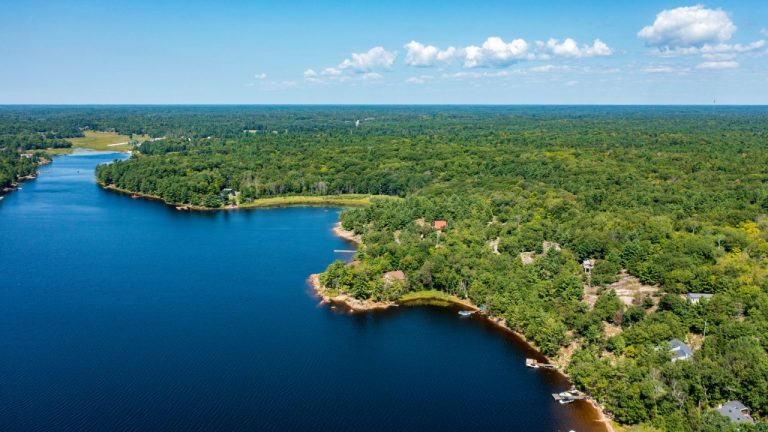Picture this: You wake up to the sound of gentle waves, sip your morning coffee while overlooking the water, and spend your afternoons fishing, swimming, or simply relaxing by the dock. Sounds perfect, right? But before you jump into buying that dream waterfront cottage, you need to consider some critical factors.
Buying a cottage on a lake or river isn’t just about the view—it’s about understanding water quality, property restrictions, local regulations, activities, and potential risks like flooding or erosion. This guide will walk you through everything you need to know before investing in a waterfront property.
1. Water Quality & Environmental Factors
A beautiful waterfront means nothing if the water is unswimmable or filled with algae blooms! Here’s what to check:
-
Water Clarity & Depth – Is the water crystal clear or murky? Some lakes have shallow, weedy shorelines, while others have deep, clean water perfect for swimming.
-
Algae Blooms – Some lakes suffer from seasonal algae blooms that can make swimming unsafe.
-
Spring-Fed vs. River-Fed – Spring-fed lakes tend to have cleaner, more stable water levels, while rivers may have stronger currents or fluctuating depths.
-
Invasive Species – Zebra mussels, Eurasian watermilfoil, or other invasive species can impact the ecosystem and maintenance costs.
-
Local Conservation Efforts – Some lakes and rivers have environmental protections that could limit your ability to alter the shoreline.
Tip: Contact the local conservation authority or cottage association for recent water quality reports.
2. Property Use & Ownership Restrictions
Before you buy, make sure you legally own and can use the land as you wish!
-
Shore Road Allowance (SRA) – Some waterfront properties have a 66-foot government-owned strip between your property and the water. Can you buy it? Can you build on it?
-
Zoning Regulations – Some areas have strict rules about what you can build, renovate, or rent out.
-
Septic & Water Systems – Many waterfront properties use septic tanks and draw water from the lake. Check if the system is compliant and functional.
-
Deeded Access vs. Public Access – Do you own your waterfront, or is it shared with neighbours? Some cottages have deeded lake access rather than private shorelines.
-
Short-Term Rental Rules – If you plan to rent your cottage on Airbnb, check the local municipality’s stance on short-term rentals. Some areas ban them entirely!
Tip: Always review the property title and survey before making an offer.
3. Recreational Activities & Boating Restrictions
Not all lakes and rivers are ideal for all activities. Make sure your dream cottage supports your hobbies!
-
Boating Restrictions – Some lakes have limits on motor sizes or designated no-wake zones.
-
Swimming Conditions – Some shorelines have deep, rocky drop-offs, while others are sandy and family-friendly.
-
Fishing Regulations – Check if the lake has catch limits, fishing seasons, or protected species.
-
Winter Accessibility – Does the lake freeze? Is it safe for snowmobiling or ice fishing?
-
Public vs. Private Boat Launches – Some lakes have easy access, while others may require costly docking solutions.
Tip: Talk to locals about summer vs. winter lake conditions before buying.
4. Flooding, Erosion & Ice Concerns
Waterfront property comes with natural risks, and you don’t want to be surprised by flooding or an eroding shoreline.
-
Flood History – Check historical water levels and flood reports.
-
Erosion Issues – Some shorelines require reinforcement to prevent them from washing away.
-
Dock Damage from Ice – Does the ice shift in winter and destroy docks or boathouses?
-
Water Level Management – Some lakes are controlled by dams that change water levels unexpectedly.
Tip: Ask for insurance quotes before buying to understand potential risks.
5. Infrastructure & Utilities
Unlike city homes, some cottages lack essential utilities or require expensive upgrades.
-
Road Access – Is the cottage accessible year-round, or do you need a snowmobile in winter?
-
Internet & Cell Service – Some areas have limited service, making remote work difficult.
-
Garbage Collection – Some areas require transporting garbage to a local dump.
-
Electricity & Propane – Check if the property has hydro or requires a generator or propane for power.
Tip: If you plan to live there full-time, ensure utilities meet your needs year-round.
Final Thoughts: Do Your Research & Work with a Local Realtor
Buying a cottage is exciting, but skipping research can lead to major headaches. A local realtor (like me! 😉) can help navigate restrictions, market trends, and property risks. Let’s chat if you’re considering buying a cottage on a lake or river! I’d love to help you be where you want to be.
📞 Call or Text Lisa Selvage at 705 644 9277, Muskoka Region
📧 Email me at lisamae@allpointsnorth.ca
📞 Call or Text Shirlene Johnston at 705-774-1144, Parry Sound Region
📧 Email me at info@allpointsnorth.ca

